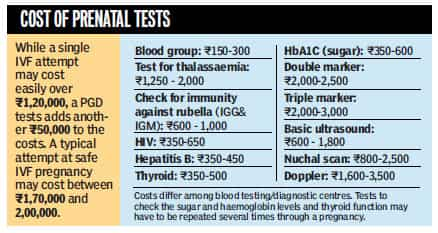Testing times before a baby
Modern diagnostic tools are helping gynaecologists detect more foetuses with genetic disorders. Jaya Shroff Bhalla writes.
Are you pregnant or planning to have a baby? If you are, just the tests to ensure your baby is free of inherited genetic disorders can run up to Rs. 2 lakh, depending on your age and the history of diseases in both families.

Modern diagnostic tools are helping gynaecologists identify an increasing number of foetuses with genetic disorders. Women choosing to conceive after the age of 35, unhealthy, inactive lifestyles with poor diet, smoking and alcohol, and yet unidentified environmental factors are increasing the number of foetuses being identified with genetic disorders. “We usually advise women to undergo certain tests even before they conceive to identify problems in the parents’ medical history and accordingly prepare them for a healthy pregnancy,” says Dr Alka Sinha, senior consultant, foetal medicine at BL Kapur Super Speciality Hospital.

“These tests are repeated in the first trimester. Between the 11th and 13th weeks, we test for the double marker, which is a simple blood test along with an ultrasound nuchal scan to check for chromosomal abnormalities,” said Dr Anuradha Kapur, senior consultant, department of gynaecology at Max Healthcare. This test measures the fluid collected under the skin at the back of the baby’s neck to assess the risk of Down’s Syndrome and other chromosomal and genetic disorders.
About one in 20 women above the age of 35 years are at risk of having a baby with Down’s Syndrome. If the scan reveals a high probability of Down's Syndrome, the only way to confirm is amniocentesis, which are invasive pre-natal tests. Samples are drawn from the amniotic fluid or a piece of placenta is extracted or blood sample taken from the foetus to rule out infections.
“In India, pregnancies can be medically terminated up to 20 weeks. So, a pregnant woman must get another ultrasound done between the 18th and 20th weeks to check the foetus for abnormalities in the heart, lung or kidney,” said Dr Kapur. Closer to the delivery dates, women are asked to take sugar tests again, and after 28 weeks, undergo another Doppler test. But at this stage, even if there are abnormalities, termination of pregnancy is not an option.
That’s one reason why Delhi-based engineers Rohit and Priya Chabbra were forced to abort two foetuses after prenatal tests in the second trimester revealed that she were carrying babies with thalassaemia, a merited blood disorder. They opted for in-vitro fertilisation (IVF) the third time. IVF conception gave them the option to test for genetic defects in the baby before the implantation of the embryo, assuring them a healthy baby. Priya is expecting her baby early next year.
Pre-implantation genetic diagnosis (PGD) tests embryos within the first five days of formation using IVF for genetic disorders. Only healthy embryos that test negative are implanted. The test costs R50,000 but it’s well worth it. “Besides the money wasted, abortion causes mental trauma. We advise IVF parents with detrimental factors such as late age of conception, bad genetic family history, poor health or past miscarriages to undergo the test,” Dr Abha Mazumdar, IVF head at Sir Ganga Ram Hospital.
Prenatal FAQs
Who needs prenatal tests?
All pregnant women must take several prenatal tests at different stages of pregnancy all through the nine months.
What could be the total cost of the tests?
It could range from Rs. 25,000 to Rs. 40,000 depending on the centre you go to. Costs could go up to Rs. 1 lakh or more if yours is a high-risk pregnancy.
What is a high-risk pregnancy?
Women who are adolescents or older than 35, have a history of premature births, have already had babies with heart or genetic problems, are carrying two or more babies, have high blood pressure, diabetes, thyroid, heart or kidney problems, cancer, HIV, hepatitis, thalassemia minor or seizure disorder.
Is IVF the only option if I have a history of pregnancy terminations because of genetic or other faults?
Of course not. One can opt for the normal conception but tests for genetic disorders in the baby can only be done between the 11th and 14th weeks, which could mean another termination if the child again carries the defect.
How does pre-implantation genetic diagnosis (PGD) help?
It can be done only in IVF conceptions before the embryo is implanted in the woman. With the evolution of science, one can check for genetic abnormalities even before implantation, hence preventing a case of genetic disorder in the child.
Which are the centres offering PGD?
Reliance laboratories in Mumbai and Sir Ganga Ram Hospital in Delhi offer PGD.
Catch your daily dose of Fashion, Health, Festivals, Travel, Relationship, Recipe and all the other Latest Lifestyle News on Hindustan Times Website and APPs.



